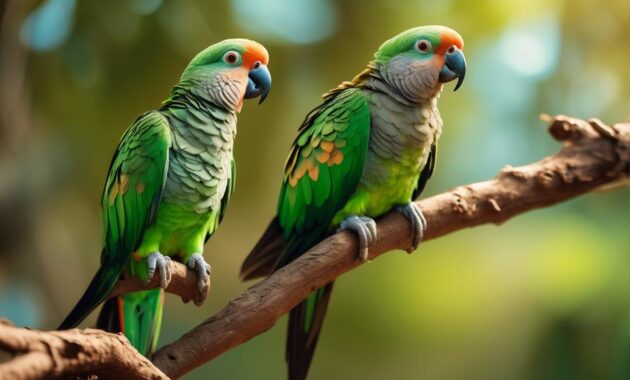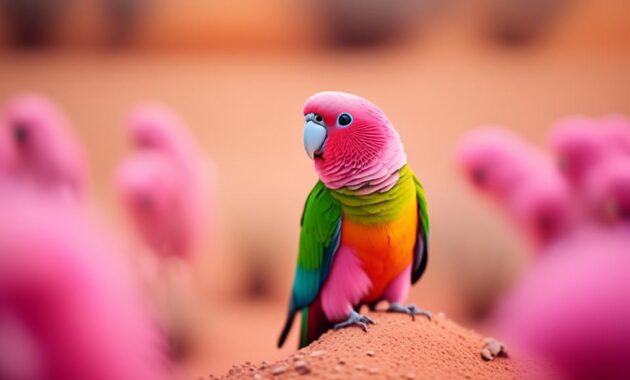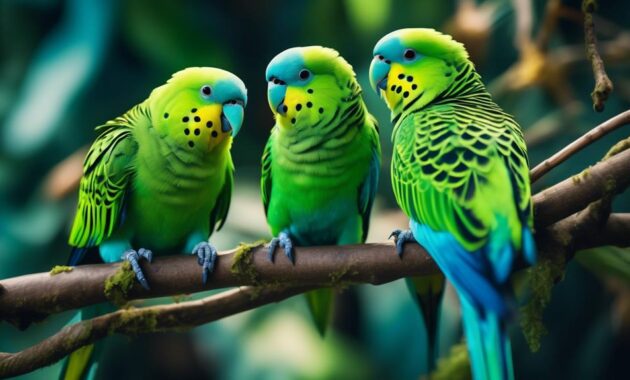
Are you tired of coming home to a quiet and empty apartment? Yearning for a companion that can bring color and life into your space?
Look no further than the vibrant African Lovebirds! These enchanting creatures, with their dazzling feathers and lively personalities, are the perfect addition to any apartment.
But what sets them apart from other pets? Well, let’s just say that their vibrant presence is just the beginning.
Key Takeaways
- African Lovebirds are small in size, making them suitable for small cages and apartments.
- They are energetic birds that require plenty of exercise and free space.
- With proper care and a healthy environment, African Lovebirds can live up to 15 years.
- African Lovebirds are known for their vibrant colors and visually appealing appearance.
Size and Exercise
African Lovebirds are small and energetic birds, making them perfect for apartment living and small cages. They measure around 5-6 inches in size and have a small, tapered tail. With an average weight of about 2 ounces, they’re suitable for confined spaces.
These birds are full of energy and require plenty of exercise and free space to keep them happy and healthy. Despite their petite size, they need room to fly and stretch their wings. Regular exercise is essential for their physical and mental well-being.
Lifespan and Care

Taking proper care of African Lovebirds is essential for ensuring their long and healthy lifespan. These beautiful birds have an average lifespan of 15 years, but with the right care and environment, they can live even longer. Their hardy nature contributes to their longevity, but regular vet check-ups are still important to ensure their well-being.
Providing a balanced diet and a clean living environment are also crucial for their overall health. Lovebirds are known for their affectionate and loving habits, and by taking good care of them, you can enjoy their companionship for many years to come.
Remember to create a nurturing environment and give them the attention they need to thrive and be happy.
Bird Species and Behavior

Lovebirds, belonging to the Lovebird species, are known for their affectionate and loving habits. When it comes to their behavior, here are some key points to keep in mind:
- Lovebirds form lifelong relationships and spend a lot of time cuddling with their mates.
- They belong to the African Lovebird family, which consists of around nine different breeds.
- While they’re similar in color, each breed has a distinct head coloration.
- African Lovebirds have a vibrant and visually appealing appearance, with a light green body and heads that can be red, light orange, black, or brown.
Understanding the species and behavior of African Lovebirds can help you provide the right environment and care for these vibrant and affectionate pets in your apartment.
Colors and Appearance

When it comes to their appearance, African Lovebirds showcase a variety of vibrant colors and gradients on their petite frames. Their bodies are usually light green, while the coloration of their heads can range from red, light orange, black, to brown. Additionally, their chests are often light pale yellow.
What makes African Lovebirds so visually appealing is the fact that different subspecies display a wide array of colors and gradients. These vibrant hues on their small frames make them stand out and catch the eye. Whether it’s their striking red head or their beautiful combination of colors, African Lovebirds are truly a sight to behold.
Sounds and Vocal Abilities

African Lovebirds have a moderate range of natural calls consisting of chirps, tweets, and beeps. They aren’t known for their talking or mimicking abilities. Their sounds are melodic and pleasant.
They’re suitable as apartment pets due to their quiet nature. If trained from a young age, they can learn a few words.
- Their natural calls include chirps, tweets, and beeps.
- Lovebirds aren’t known for their ability to talk or mimic sounds.
- Their melodic sounds are pleasant to the ear.
- Their quiet nature makes them ideal for apartment living.
Cage and Apartment Suitability

Suitable for small living spaces, African Lovebirds are an ideal choice as apartment pets. Their small size makes them suitable for small cages and apartments, ensuring they have enough space to move around comfortably. Here is a table showcasing the suitability of African Lovebirds for apartments:
| Aspect | Suitability |
|---|---|
| Size | Small |
| Noise Level | Quiet |
| Exercise Needs | Moderate |
| Cage Size | Small |
| Compatibility with Neighbors | Good |
With their moderate exercise needs and quiet nature, African Lovebirds are unlikely to disturb your neighbors. They are content with a small cage and do not require a lot of space to fly around. However, it is important to provide them with plenty of toys and perches to keep them mentally stimulated. With proper care and attention, African Lovebirds can thrive in an apartment setting and bring joy to your living space.
Diet and Feeding

With their living space suitability established, let’s now explore the essential aspect of diet and feeding for African Lovebirds. When it comes to keeping your African Lovebird healthy and happy, it’s important to provide them with a well-balanced diet. Here are some key points to keep in mind:
- Offer a variety of fresh fruits and vegetables such as apples, carrots, and leafy greens. These provide essential vitamins and minerals.
- Provide a high-quality pellet or seed mix specifically formulated for Lovebirds. This will ensure they receive the necessary nutrients.
- Offer small amounts of treats such as millet sprays or small pieces of nuts. These can be given as occasional rewards.
- Always ensure a fresh supply of clean water is available. Lovebirds need to stay hydrated throughout the day.
Socialization and Bonding

To ensure a strong bond with your African Lovebird, prioritize socialization from an early age. Interact with your lovebird daily, providing opportunities for it to become comfortable with your presence and touch. Offer treats and gentle handling to establish trust and positive associations.
Encourage socialization by introducing your lovebird to different environments, sounds, and experiences. Allow supervised interactions with other people and animals to promote social skills and prevent fearfulness or aggression.
Participate in activities that stimulate your lovebird’s mind, such as puzzle toys or training sessions. Remember to be patient and consistent in your socialization efforts, as it may take time for your lovebird to fully adjust and develop a bond with you.
Play and Enrichment

To ensure your African Lovebird stays mentally stimulated and happy, it’s important to provide them with plenty of opportunities for play and enrichment. Here are some ways you can keep your lovebird entertained:
- Offer a variety of toys: Lovebirds enjoy chewing, so provide them with safe and stimulating toys made of wood or natural materials.
- Create a play area: Set up a designated space outside the cage where your lovebird can explore and exercise. Include perches, ladders, and swings to keep them active.
- Rotate toys regularly: Keep your lovebird’s interest by rotating their toys every few days. This will prevent boredom and encourage exploration.
- Provide foraging opportunities: Hide treats or food in puzzle toys or wrap them in paper for your lovebird to find. This will engage their natural foraging instincts and keep them mentally engaged.
Grooming and Hygiene

Regular grooming and hygiene practices are essential for keeping your African Lovebird healthy and happy. By maintaining proper cleanliness, you can prevent the buildup of dirt, dust, and bacteria, which can lead to infections and other health issues. Here are some grooming and hygiene practices you should follow:
| Grooming and Hygiene Practices |
|---|
| Regularly clean the cage and accessories |
| Provide fresh water daily |
| Trim the nails to prevent overgrowth |
| Bathe your Lovebird regularly |
| Monitor their feather condition |
Cleaning the cage and accessories will ensure a clean environment for your Lovebird. Fresh water should be provided daily to keep them hydrated. Trimming their nails will prevent them from getting too long and causing discomfort. Regular bathing helps keep their feathers clean and healthy. Lastly, monitoring their feather condition allows you to identify any abnormalities or signs of illness. By following these practices, you can ensure that your African Lovebird stays clean, healthy, and happy.
Health and Veterinary Care

Taking care of your African Lovebird’s health and providing veterinary care is crucial for their overall well-being. Here are some important points to consider:
- Regular Vet Check-ups: Schedule regular visits to the veterinarian to ensure your lovebird is healthy and to catch any potential health issues early.
- Proper Nutrition: Feed your lovebird a balanced diet consisting of high-quality pellets, fresh fruits, and vegetables to ensure they receive all the necessary nutrients.
- Hygiene and Cleanliness: Keep their cage clean by regularly changing the bedding and providing fresh water. This helps prevent the spread of diseases and ensures a clean living environment.
- Exercise and Mental Stimulation: Provide plenty of opportunities for your lovebird to exercise and engage in mental stimulation activities. This can include providing toys, perches, and supervised playtime outside the cage.
Training and Tricks

Once you’ve ensured the health and well-being of your African Lovebird, it’s time to explore the exciting world of training and tricks. African Lovebirds are intelligent and eager to learn, making them excellent candidates for training.
Start with simple commands like ‘step up’ or ‘come here,’ using positive reinforcement such as treats or praise. With consistent practice and patience, you can teach them more complex tricks like fetching objects or even performing acrobatics.
Lovebirds are highly social, so training sessions can also be an opportunity for bonding and strengthening your relationship with your pet. Remember to keep training sessions short and enjoyable, as lovebirds have short attention spans.
With dedication and love, your African Lovebird will amaze you with its cleverness and ability to learn new tricks.
Tips for a Happy Lovebird Home

To create a happy home for your African Lovebird, there are a few key tips to keep in mind.
- Provide a spacious cage: African Lovebirds are energetic and require plenty of exercise. Make sure their cage is large enough for them to spread their wings and move around freely.
- Offer a balanced diet: Feed your Lovebird a variety of fresh fruits, vegetables, seeds, and pellets to ensure they receive all the necessary nutrients. Avoid feeding them avocado, chocolate, caffeine, and alcohol, as these can be toxic to birds.
- Create a stimulating environment: Lovebirds are intelligent and curious creatures. Provide them with toys, perches, and puzzles to keep them mentally stimulated and prevent boredom.
- Spend quality time with your Lovebird: These birds thrive on social interaction. Make sure to spend time with them daily, talking to them and providing them with attention and affection.
Frequently Asked Questions
How Do African Lovebirds Bond With Their Owners?
African Lovebirds bond with their owners through affectionate and loving habits. They form lifelong relationships and enjoy cuddling with their mates. With time and care, they will develop a strong bond with you.
What Kind of Toys and Enrichment Activities Do African Lovebirds Enjoy?
African Lovebirds enjoy a variety of toys and enrichment activities. They like toys that they can chew on and manipulate, such as wooden blocks and ropes. Providing them with swings and ladders can also keep them entertained.
Can African Lovebirds Be Kept With Other Bird Species?
Yes, African Lovebirds can be kept with other bird species as long as they are compatible and have enough space. However, it is important to monitor their interactions and ensure that all birds are safe and comfortable.
How Often Should African Lovebirds Be Taken to the Vet for Check-Ups?
You should take your African Lovebirds to the vet for regular check-ups to ensure their well-being. With proper care and a healthy environment, they can live a long and happy life.
Can African Lovebirds Be Trained to Do Tricks Like Other Bird Species?
Yes, African Lovebirds can be trained to do tricks like other bird species. With patience and consistent training, they can learn to perform various tricks and behaviors, adding to the joy of owning them.
– Can Red Rumped Parrots Be Kept as Apartment Pets Like African Lovebirds?
Yes, a colorful red rumped parrot can be kept as an apartment pet, just like African lovebirds. They are small and relatively quiet, making them suitable for apartment living. However, proper care and attention to their needs, including space for flying and mental stimulation, are important for their well-being.
Conclusion
In conclusion, African Lovebirds are the ideal choice for apartment living.
Their small size and energetic nature make them well-suited for small spaces. With proper care and a healthy environment, they can live up to 15 years, bringing joy and vibrancy to your home.
Their affectionate behavior and visually appealing colors make them a delightful companion. Additionally, their moderate vocal abilities and low-maintenance grooming make them perfect for apartment dwellers.
So why wait? Bring home an African Lovebird and experience the joy they bring!




